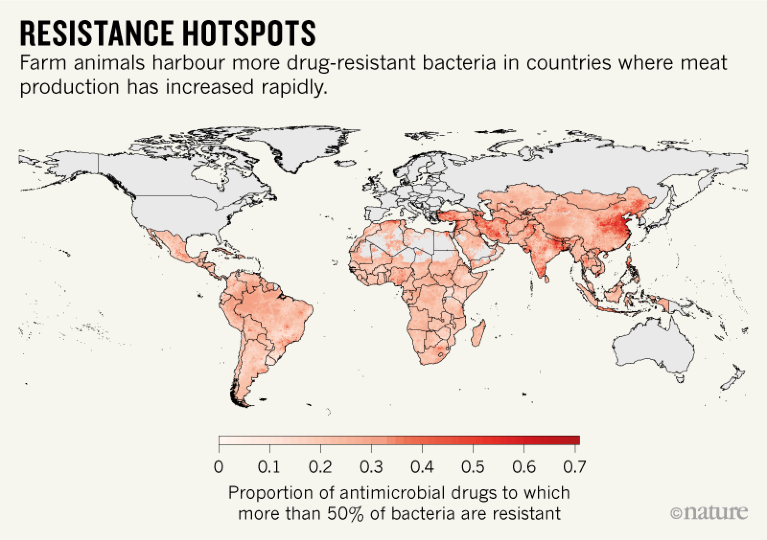RESEARCH
Physicists close in on neutrino’s mass An experiment in Germany has made the most precise measurement yet of the maximum mass of neutrinos — light subatomic particles that are so difficult to measure that physicists have only been able to estimate the upper limit of their mass. The first results from the Karlsruhe Tritium Neutrino (KATRIN) experiment, presented on 13 September, reveal that a neutrino weighs at most 1.1 electronvolts (eV). Previous measurements put the upper bound at 2 eV. Neutrinos are among the most abundant particles in the Universe, but they tend to cross matter undetected, making them difficult to measure directly. KATRIN monitors the nuclear decay of the ‘heavy’ hydrogen isotope tritium. During this process, a neutron turns into a proton and emits an electron and a neutrino. KATRIN indirectly measures the range of energies of the unseen neutrinos, which in turn reveals their mass.

The KATRIN experiment monitors the nuclear decay of the hydrogen isotope tritium.Credit: Michael Zacher
POLICY
Research security After months of outcry over whether the United States government is unfairly targeting foreign-born researchers over purported security breaches, President Donald Trump’s science adviser is launching an effort to strengthen US policies on research security. The National Science and Technology Council (NSTC) is working to establish government-wide requirements for what information researchers need to disclose to receive federal research grants, White House science adviser Kelvin Droegemeier said in a letter on 16 September. A panel formed by the NSTC in May is collecting “an array of examples in which our research enterprise was exploited or compromised”, he wrote. Droegemeier told Nature that it was too early to say how many people federal agencies have investigated for potential security breaches.
Flu vaccines The US government is launching a programme to modernize the development of flu vaccines. President Donald Trump signed an executive order on 19 September directing the Department of Health and Human Services and the Department of Defense to propose a plan and budget for the effort within 120 days. The goal is to improve the country’s ability to prepare for a future outbreak of pandemic flu, and to develop better vaccines to protect against seasonal outbreaks. The programme will support research to create a universal flu vaccine to replace the seasonal vaccine developed each year. The government will also develop a strategy for switching to faster methods of making seasonal flu vaccines. Currently, manufacturers produce most flu vaccines using chicken eggs, a process that takes at least six months.
US emissions fight US President Donald Trump’s administration has revoked California’s legal authority to set its own fuel-efficiency standards for vehicles. The move, made on 19 September, furthers the administration’s push to weaken an array of regulations put in place by Trump’s predecessor, Barack Obama, to reduce greenhouse-gas emissions. California and 23 other states filed suit against the federal government on 20 September, seeking to reverse its decision. The federal Clean Air Act allows other states to adopt California’s fuel-efficiency standards as their own, and 13 — plus Washington DC — have done so. Trump-administration officials have said that creating a single national standard will prevent unnecessary fuel-efficiency upgrades that increase the price of cars — and that inadvertently keep older, more dangerous vehicles on the road.
ENVIRONMENT
Valuing nature The broadcaster David Attenborough will be the public face of a UK government-commissioned review into the economic value of biodiversity. The review, which will be chaired by economist Partha Dasgupta of the University of Cambridge, UK, will examine the contribution of ecosystem services — such as pollination and carbon sequestration by forests — to the size and growth of economies worldwide. According to some estimates, benefits provided by the natural environment are understood to be worth tens of trillions of dollars per year, and the idea behind the review is that if this can be accurately quantified, it will compel countries to think twice before allowing development on green spaces. There is currently no consensus on how nature should be valued. The review panel expects to issue its report in time for the conference of the parties to the United Nations Convention on Biological Diversity in China in October next year.
ENERGY
Nuclear disaster A Tokyo court has cleared three power-company executives of criminal negligence relating to the 2011 Fukushima nuclear disaster. The 19 September ruling acquitted Tsunehisa Katsumata, Sakae Muto and Ichiro Takekuro, formerly of the Tokyo Electric Power Company, which operated the Fukushima Daiichi nuclear power plant. Three of the plant’s six reactors melted down after the magnitude-9 Tohoku earthquake and subsequent tsunami on 11 March 2011. The disaster led to the evacuation of roughly 150,000 people. Prosecutors had accused the three executives of failing to act on information that showed the plant was at risk, and of causing the deaths of 44 people who had to be evacuated from hospital. The court’s ruling stated that the executives’ actions had been in line with government safety guidelines.

The Fukushima Daiichi nuclear power plant after a massive earthquake and subsequent tsunami in March 2011.Credit: DigitalGlobe/Getty
Renewable feat The Australian capital, Canberra, will become the first city outside Europe to shift from fossil fuel to 100% renewable energy. From 1 January 2020, Canberra will join seven other districts around the world that produce or purchase the equivalent of their total electricity consumption from renewable sources, according to a report released on 18 September by policy think tank the Australia Institute in Canberra. The report analysed data on more than 500 regions around the world with populations greater than 100,000 people. The district of Rhein-Hunsrück in Germany became the first area to go 100% renewable, in 2012; two German states, three states in Austria and one region in Spain followed.
Research integrity
Brain investigation A neuroscientist committed scientific misconduct in research in which he claimed to have developed a brain-monitoring technique able to read the thoughts of paralysed people, Germany’s main research agency has found. The DFG’s investigation into Niels Birbaumer’s work found that data in two papers were incomplete and that the scientific analysis was flawed. On 19 September, the agency, which funded some of the work, announced that it was banning Birbaumer from applying for its grants for five years and recommended the retraction of the two papers. “The DFG has found scientific misconduct on my part and has imposed sanctions. I must therefore accept that I was unable to refute the allegations made against me,” Birbaumer said in a statement to Nature. Birbaumer says he stands by his studies.
ANNOUNCEMENT
Nature is withdrawing a 2017 mentoring prize awarded to Carlos López-Otín, a molecular biologist at the University of Oviedo in Spain. Following concerns reported to Nature after the announcement of the 2017 Nature Awards for Mentoring in Science, an assessment of papers co-authored by Carlos López-Otín has identified image-integrity issues. The withdrawal of the award is a reflection of the judges’ opinion that high-quality mentorship in a laboratory should not lead to such significant issues. It is not a judgement of the overall calibre of López-Otín’s research.
TREND WATCH
Farm animals in India and northeast China are becoming more resistant to common antimicrobial drugs as meat production increases, researchers report. Hotspots of drug resistance are also emerging in Kenya, Uruguay and Brazil, according to a study of antimicrobial resistance in livestock across Asia, Africa and South America, published on 19 September in Science. Meat production has risen sharply in these regions since 2000, fuelled by more intensive farming practices, including the use of antibiotics in animals. The study’s authors analysed 901 epidemiological studies, conducted in developing nations, that focused on four common bacteria: Salmonella, Campylobacter, Staphylococcus and E. coli. They used the information to map where multidrug resistance exists, and where it is starting to emerge. Their results also indicate that the types of antimicrobial drug most commonly used in farm animals to help them gain weight are also the ones with the highest resistance rates. Between 2000 and 2018, the proportion of drugs to which bacteria have become resistant almost tripled in chickens and pigs, and doubled in cattle.

Source: T. P. Van Boeckel et al. Science 365, eaaw1944 (2019).





